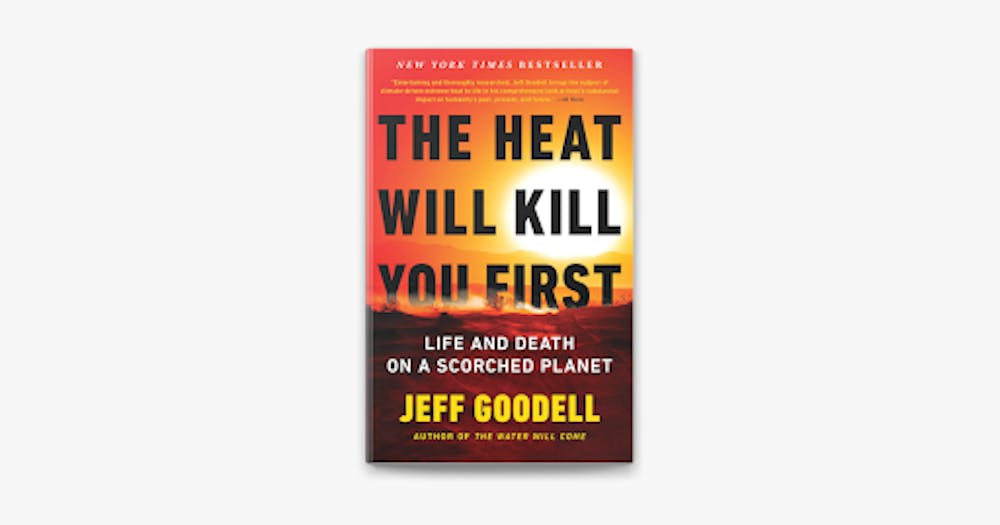By Lilly Ward
Staff Writer
Heat is “the origin of all things and the end of all things,” writes Jeff Goodell. As a journalist who has covered climate change for over two decades, Goodell is concerned with the end and what it will bring. What will happen to crops that cannot tolerate rising temperatures? How will congested cities deal with life threatening heat waves? How long will it be before all of the coral in the Great Barrier Reef becomes bleached?
Goodell is a New York Times best-selling author of six previous books, including “The Water Will Come: Rising Seas, Sinking Cities, and the Remaking of the Civilized World,” which was a New York Times Critics Top Book of 2017. His new book, “The Heat Will Kill You First: Life and Death on a Scorched Planet,” paints a vivid — if not horrifying — image of how climate change operates in the present. Heat is a subtle but insidious force, more powerful than we know, Goodell stresses.
Often, we recognize the danger of heat too late. Goodell offers intimate portraits of lives lost to record high temperatures (the cause of death being hyperthermia). He tells the heart wrenching tale of a family in California’s Sierra Nevada foothills who perished during a recreational hike gone wrong. He chronicles the day of a Guatemalan landscaper who came to the U.S. to earn enough money to build a house back home, only to succumb to heatstroke. In Chennai, India, a wife and husband’s daily routine is “defined and driven by heat” in their 300 square foot hut. The personal nature of the stories allows the reader to recognize the threat of climate change as an immediate issue rather than a distant worry.
Goodell skillfully oscillates between anecdotes and technical explanations of climate change. It is easy to follow the comprehensive yet worrying analogies, such as, “By one measure, the amount of heat being added to the ocean is equivalent to every person on the planet running a hundred microwave ovens all day and night.”
Whether he is breaking down the issues with global use of air conditioning (which contributes to greenhouse gas emissions) or explaining how global warming contributes to the spread of diseases globally, he makes the urgency of climate change clear. If Goodell wants readers to know one thing, it is that continuing to burn fossil fuels will cause irreparable harm to our planet. His assertion that the future is already fraught can deflate hope.
“Because CO2 stays in the atmosphere for thousands of years, it’s not going to cool off when we finally stop emitting CO2 into the atmosphere,” writes Goodell.
Much of “The Heat Will Kill You First” is about culpability. To what extent, for example, is a company like ExxonMobil responsible for extreme weather events such as hurricanes? How about the fact that “93 percent of the corals in the Great Barrier Reef have been impacted by some level of bleaching?” Who is to blame for sea level rise?
Goodell wastes no time in naming corporate greed as the origin of climate change. After all, climate change is far from a new concept. In 1977, “Exxon (now ExxonMobil) not only knew that decades of burning fossil fuels would heat up the atmosphere, but developed in-house climate models that projected those changes with remarkable accuracy,” wrote Goodell.
Knowledge is power — or at least that is how the saying goes. But what if having knowledge is what makes you feel powerless? This is what the reader grapples with. Goodell is so good at portraying the intricacies of disaster that it is all too easy to wonder whether ignorance is bliss. However, Goodell does manage to offer some sliver of hope for the planet's future.
Throughout the novel, readers are introduced to figures who work to help humanity survive the heat. Godell introduces climate change researchers, such as climate scientists Friederike Otto and Myles Allen, who pioneered models that allow scientists to assess whether certain weather events are caused by climate change.
He also highlights farmers working to create heat resistant crops, and individuals working to establish federal labor standards to avoid unsafe heat exposure. Even in a world embroiled in the folly of humanity, these figures manage to shine. Their passion and refusal to be passive to further damage reminds us that there is still hope.
“With their help, and the help of other people like them, I believe we can build a better world if we want to,” said Goodell.







